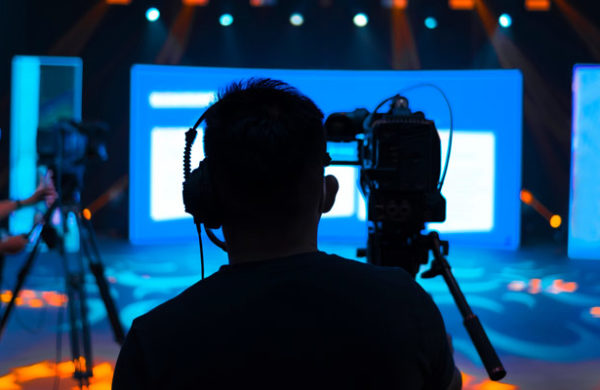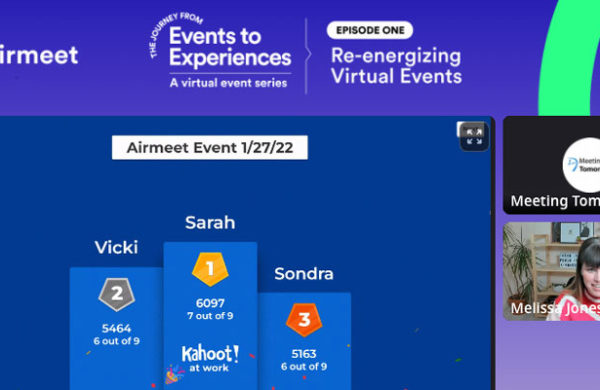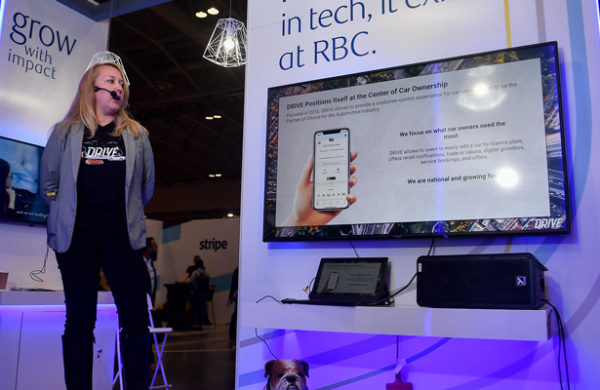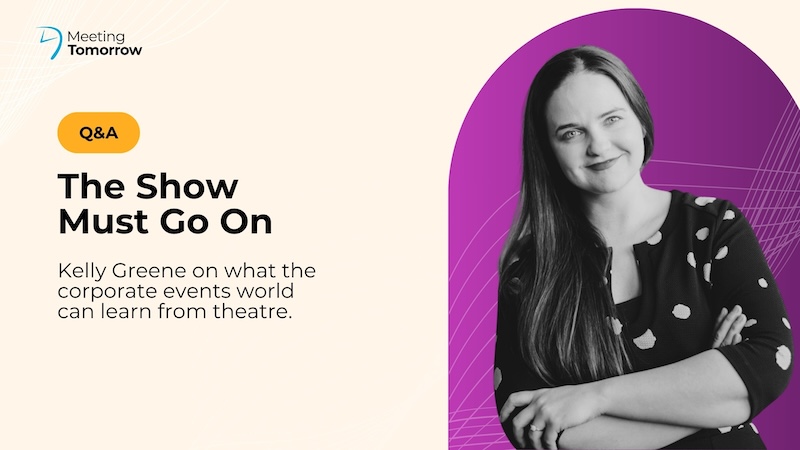
If you catch Kelly Greene onsite at an event, you’ll probably find her in a headset backstage or patrolling the perimeters of the event floor. Kelly is our Director of Event Production Services here at Meeting Tomorrow, leading our team of producers and project managers and making sure all of our events are running without a hitch.
When it comes to her quick thinking, her magic in calming a nervous presenter or operating a sound board, she credits it all back to her theatre roots. A performance major throughout college and a theatre kid at heart, Kelly’s introduction to the stage came long before she stepped into corporate events.
We caught up with Kelly to do a deep dive into her journey and hear her tips, tricks, and takes on what corporate events could learn from theatre.
Let’s start with your early days. Before corporate events, what sparked your interest in theatre?
I took an Intro to Theatre class my freshman year of high school. To get extra credit, I auditioned for Oklahoma and they cast me as one of the extras in the chorus. I didn’t really have a big part, but I was able to sing in all the big choral numbers. From that moment, I just sort of had the bug.
My first year in college, I wasn’t cast in any of the performances, but I knew I still wanted to be involved in some way. So I asked one of the directors if there was anything else that I could do and they said they needed a stage manager for one of the shows. I didn’t know anything about stage management, but once I started doing it I realized that this is actually what I truly love doing. I loved bringing all of the different departments together, and seeing the full vision come to life.
And that’s what I still love about live events to this day. There’s something really special about working together with multiple teams to build something from the ground up.
After soaking up the theatre world for so long, how did you then find the events world?
I was working as a backstage hand on a play right after college, and I met somebody who mentioned that they were doing these corporate events. I was like, “I wish I had known about this in college.” Because this is exactly the kind of work I’m doing here in theatre, just for a different audience.
My very first job in this industry was for The Coca-Cola Company. Basically, my whole job for three days was to stand next to a big sign and point in the same direction towards lunch because the dining room doors were under a big set of stairs. That was my first introduction into the industry, but it was a really good one because it reinforced the need for multiple touch points when you’re trying to move a large group of people. You need information in an app, you need physical or digital signage, and you need people there to direct them. All these different points are necessary because everybody absorbs information in a different way. By standing there, I ended up answering a lot of other questions and I became a visible face of support.
So yes, it was a little bit of a tedious first job, but it gave me a really good perspective into the audience’s experience and what their needs are.
That’s so interesting how one door closed and it led you to discover that you enjoyed being backstage. And that led you down the path of being a producer and what you’re doing now in events, even if it started with holding a sign.
Right?! I think for most of my career, if I’ve hit a roadblock, I’ve never taken that as a moment to give up. It’s just a reason to look in a different direction and see what else is out there.
My theatre experience has made me a very well-rounded producer because I have experienced lots of different types of live events that are not just corporate events. It’s helped me think a bit more creatively and be a different problem solver.
I can also empathize and see people in a different way. We’re not just trying to move presenters through a rehearsal. If I see somebody really struggling and feeling nervous, I can help because I’ve been in their shoes before. I can step in and speak to them on a person-to-person level in a way they can relate to.
On that note, having been both an actor and a stage manager, how do you approach presenters who are nervous backstage? Are there theatre tricks to combat nerves?
As a stage manager, it’s helpful to know how seasoned a presenter is. If I’m working with a keynote speaker who does this for a living I’ll approach that person differently than somebody who’s internal to a company.
For someone who has never really done this before, it all starts with rehearsal time. At a minimum, there needs to be time for presenters to walk on stage and see what everything looks like. But ideally there is time for your presenters to actually practice on the stage. When you know your material, you’re able to just keep talking even through your nerves.
Backstage, I always recommend a simple 4×4 breathing exercise where you breathe in, hold, breathe out, and hold for four seconds each. You walk through a couple cycles of that and it literally changes your physiology. It slows your heart rate down and helps to calm those nerves and center you.
Another trick I learned from auditioning is to recall a happy memory. Thinking about being at dinner with friends and a hilarious story that somebody told. Or, running around on the beach with your family — just something that brings you a lot of joy and happiness. Spend 30 seconds thinking about that and let it be the last memory you have right before you walk on stage. Then you’re bringing that natural, joyful energy to the start of your presentation.
“Spend 30 seconds thinking about that and let it be the last memory you have right before you walk on stage. Then you’re bringing that natural, joyful energy to the start of your presentation.”
The last tip I have is to just speak in your natural full voice. Sometimes when people are wearing a microphone, they’re scared they’ll be too loud and then as a result they can become too quiet. A theatre tip is to speak so that you can be heard by the person in the very last row. Speak in your “outside voice” and then your audio technician will balance around that.
How about theatre tips for staying present and connecting with an audience?
It’s really helpful when the audience feels like you are engaging and looking directly at them. Most of the time you have an audience that is wider than your straight-on field of vision, so make sure to spend time talking to each side. Practice giving your remarks while looking in different directions so that you have the literal muscle memory of looking in different directions as you’re speaking.
Another theatre tip I’ve learned from auditions is to look right above people’s heads. If you’re nervous about looking directly at the faces in the crowd, find a soft focus right above their heads. It really helps the audience to feel seen and connected to.
Is there anything from the theatre world that corporate events could really learn from?
Something theatre does really well that corporate is just maybe now catching on to is the importance of great light and sound for events. Simply adding some color uplights that can be controlled by a lighting designer, or just adding some additional lighting effects can help transform the environment in a lot of ways. With audio too, adding walk-on music for presenters or tailoring the background music to your audience can really bring the right energy and set the tone for the message you’re about to share. It’s something I see theatre do exceptionally well because they’re trying to create a baseball field, a home, or a hospital with nothing more than some set pieces and lighting.
“Great event producers think about that main stage space as a setting for the story they are about to tell.”
Great event producers think about that main stage space as a setting for the story they are about to tell. Are you inspiring your salespeople to have the greatest year? Are you bringing all of your business leaders together to further develop and unify them? Whatever the main purpose of the event is, using that space to set the tone through lighting and audio and set design can be a really powerful thing that we’re not tapping into at all events.
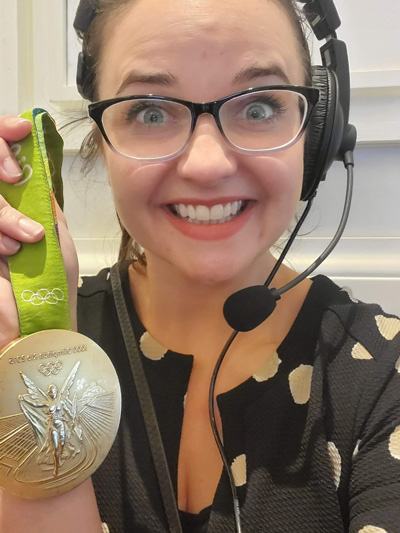
Kelly holding an Olympic gold medal after working onsite with an Olympian speaker.
I also heard that you’ll refer to events as a “show.” Why is that?
I have the “show” terminology so ingrained in me because of my theatre background. But what sets apart a meeting from a show, for me, is that a show tells a story.
Whether it’s the main stage, the branding, the activations, or the networking in between the sessions, they’re all for a specific purpose. There’s a story that’s woven through each of these individual experiences, and that woven tapestry with a cohesive message is what makes it a show. It’s about the consistency in the messaging and storytelling throughout the entire event.
Within a show, each individual comes together as the audience, and our goal is to have clear objectives, messages, and inspiration telling the story at every turn, so it transcends the individual background, history and knowledge to create a shared experience. For the few days you are here, you will experience something that can never be replicated because it’s unique to this place and time, the people here, and the stories we are creating together.
In the theatre there’s the saying, “the show must go on.” How has that mantra prepared you for handling the unexpected things that come up in corporate events?
I think that’s a great mentality, and for me it goes back to our value of commitment here at Meeting Tomorrow and getting the job done.
There are a minimal number of circumstances that would completely cancel a show. It’s always important to take safety into consideration, so “the show must go on” does not supersede safety. But it does mean that I don’t always take no for an answer.
If we find out that not all of our packages made it to the event to hang up our banners, my next thought is, “Who is in this city that might be able to print banners for us today?” “Can we go to a hardware store and buy those pieces?” “Do we have anything here that can be repurposed?” So, my brain immediately goes into problem solving.
That’s the mindset theatre has given me: if this option isn’t on the table, it means we have to come up with a different solution to meet the need or convey the same message. That’s what the saying means to me.
I’m always amazed when I hear these stories and how everyone switches into that problem solving mode to find a way to make it happen. Thanks, Kelly, for sharing your story with us today. Next time I’m presenting at a big meeting, I’m definitely going to be using the happy memory trick!
Want more? Hear more from Kelly and Meeting Tomorrow’s team on TikTok.
